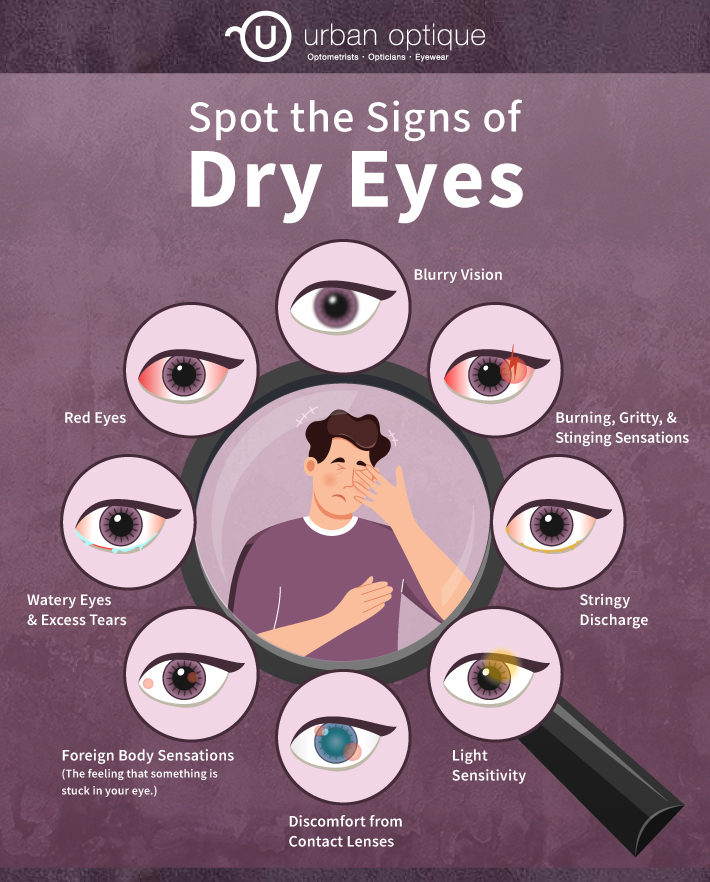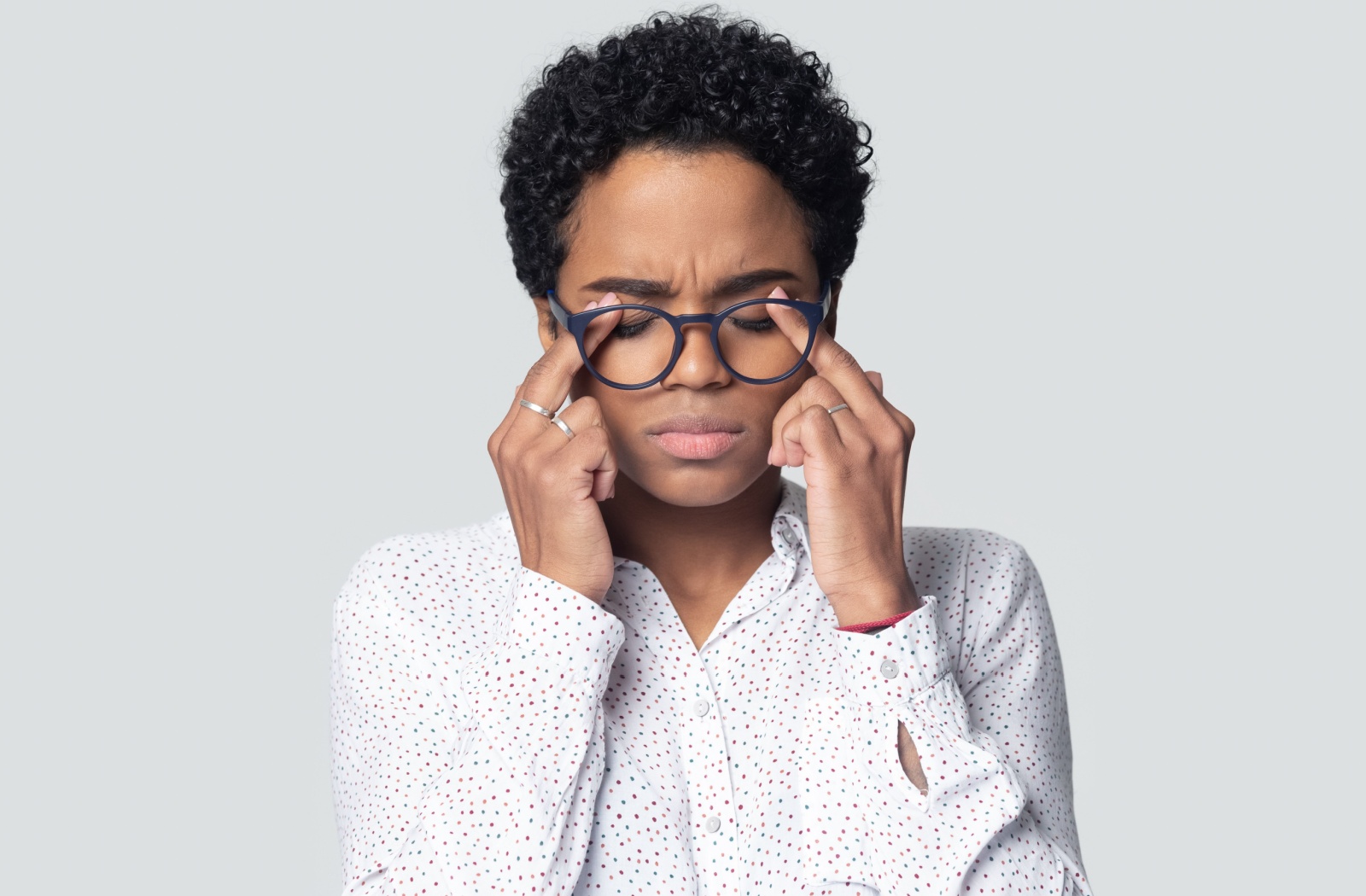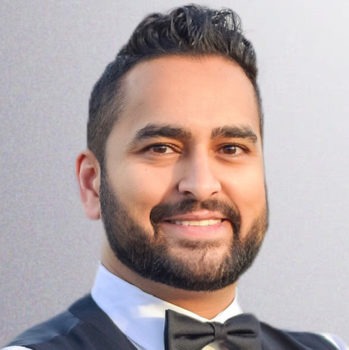Dry eye disease is a complex condition. It can affect not just your comfort but also your long-term eye health and vision. Dry eye is not just a minor issue—but it’s also not an issue you have to live with. Dry eyes can be treated to help enhance your comfort before complications occur.
Severe cases of dry eye can lead to cornea scarring and damage that may cause blindness. However, there are often opportunities to treat and manage the symptoms and causes of dry eye before it happens. Mild cases of dry eye rarely cause blindness.
With routine comprehensive eye exams, we can recommend treatments, products, and habits to help you manage dry eyes and avoid severe symptoms. Our recommendations could include anything from anti-inflammatory medication to lifestyle adjustments for enhanced ocular nutrition.
How Do You Know You Have Dry Eyes?
Some of the most common symptoms of dry eye disease include red eyes and a burning, stinging, gritty, or scratchy sensation—but those aren’t the only symptoms you might experience.
Some people with dry eyes have difficulty wearing contact lenses. You might also experience excessively watery eyes, the sensation of something being in your eye, and changes to your vision.
How Does Dry Eye Affect Vision?
Dry eye disease can cause multiple changes to your eye health that may lead to blurry vision, including changes to your tear film and cornea—the clear front part of the eye. When dry eye disease becomes severe and is left untreated, it can cause corneal scarring and more significant cornea damage that may lead to blindness.
Dry eye disease can also make one’s vision more light-sensitive. Some people with dry eyes can find driving harder at night because of the glare from traffic lights.

Are Vision Changes from Dry Eye Permanent?
In very severe cases of dry eye, the damage to the cornea may be irreversible, and the vision changes may be permanent. However, while dry eye is a serious condition, it is also highly treatable in its early stages.
It is often possible to correct blurry vision caused by dry eyes with lifestyle adjustments and dry eye treatments recommended by an eye doctor.
It’s also important to know that dry eye is just 1 possible cause of blurry vision. Long-term blurry vision can also be caused by myopia (nearsightedness), conditions that develop later in life, like presbyopia, and many other eye diseases and conditions.
If you, your child, or another member of your family experiences lasting blurry vision, you should consider getting an eye exam. If you experience sudden blurry vision, you may need to seek prompt attention from an eye doctor or urgent care centre, especially if you also experience numbness, pain, dizziness, or difficulty speaking.
Do Dry Eyes Get Better on Their Own?
In some cases, dry eye symptoms may clear up on their own, such as when they’re related to digital eye strain from looking at a screen for too long or from smoke and other external factors. However, dry eye is often chronic, meaning the symptoms can come and go over time.
Your dry eye symptoms may have specific triggers or be related to an underlying problem, such as your tear glands not working properly. In many cases, identifying the cause of your symptoms with an eye exam and getting personalized advice from an eye doctor are crucial steps for experiencing lasting dry eye relief.
How Long Do Dry Eyes Last?
The amount of time your symptoms last can vary based on what’s causing them. In some cases, you might only experience dry eyes for a few hours or days, but in other cases, the symptoms can last several weeks or months.
The time treatments take to work can also vary based on the severity of your symptoms, what’s causing them, and your health.
What Is the Best Treatment for Dry Eyes?
There is no single best treatment for dry eyes. Because there are so many possible causes, the treatment an eye doctor recommends can vary.
When you visit us for help with dry eyes, we might recommend lifestyle changes like drinking more water, eating more fish and other foods or supplements with omega-3 fatty acids, or even using a humidifier in your bedroom or office.
For dry eyes that can’t be managed with lifestyle adjustments, we might recommend artificial tears, prescription eye drops, punctal plugs—tiny plugs that help your eyes retain moisture—or other treatments.
You Can Get Help with Dry Eye Symptoms
You do not have to live with dry, burning, red eyes. When you visit us for an eye exam, we can help you determine the cause of your symptoms and provide recommendations for seeing comfortably again.
At Urban Optique, your well-being is as important to us as your vision. Schedule an appointment today to get personalized advice about dry eye and other eye conditions.
















